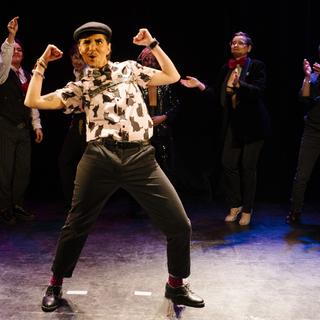


'Able to create our own masculinity': Drag kings emerge from queens' shadows
FeatureLess widely publicized, drag kings have been present in France since the late 1990s. Performers from the Kings Factory spoke with Le Monde as the group celebrated its fifth anniversary.
"From now on, you'll have to refer to me in the masculine form," said Johanna, 39, who, like her comrades, wished to remain anonymous. Facing the mirror, clad in a modest turtleneck, Johanna had just transformed into Hayden la Vidange and was busy enhancing the thick brown line under his cheekbones with an oily off-white powder to emphasize his jawline. Contouring – a make-up technique used to redefine the contours of the face – marked the first stage in this transformation into a drag king, a practice aimed at reinvesting the codes of masculinity, in contrast to drag queens, who stage femininity. And with one sweep of a contour brush, it was farewell to Johanna, the woman long plagued by shyness and haunted by gender identity conflicts in the past.
Protected from the cold on this Friday in January, in the intimate dressing rooms of the Théâtre Clavel in Paris's 19th arrondissement, la Vidange and eight other drag kings were busy. There were only a few hours to go before the show kicked off to mark five years of the Kings Factory, a group supporting French artists founded in 2019, and since transformed into an association. Most of the nine members, whether lesbian, bisexual, transgender, gender fluid or queer, have discovered, through the artistic practice of performing as a drag king, a way to delve into and affirm their gender identity and/or sexual orientation
Far less publicized than that of the queens, the kings' scene is nonetheless vibrant in France. From their first shows in cramped Parisian cellars to the group's formation in 2019, and all the way to the Musée du Quai Branly, Paris, where they put on a performance on Saturday, March 2, as part of the evening "L'Ethnologie va vous surprendre! Le corps" ("Ethnology will surprise you! The body"), these artists depict a flourishing scene that they are hoping to transition from the shadows to the spotlight in front of the general public.
While the drag scene has burst into French homes with the success of the two seasons of the show Drag Race France, launched in 2022 on France 2 television channel, only queens have competed, consecutively crowning Paloma and Keiona. Certainly, drag kings have appeared on the show, but only as guests in one-off episodes. Viewers were able to discover Jésus la Vidange – co-founder of Kings Factory with Thomas Occhio and the inspiration for several artists adopting his stage name – as well as one of his disciples, Juda la Vidange, and Chico.
'Very much rooted in a feminist culture'
You have 72.29% of this article left to read. The rest is for subscribers only.
